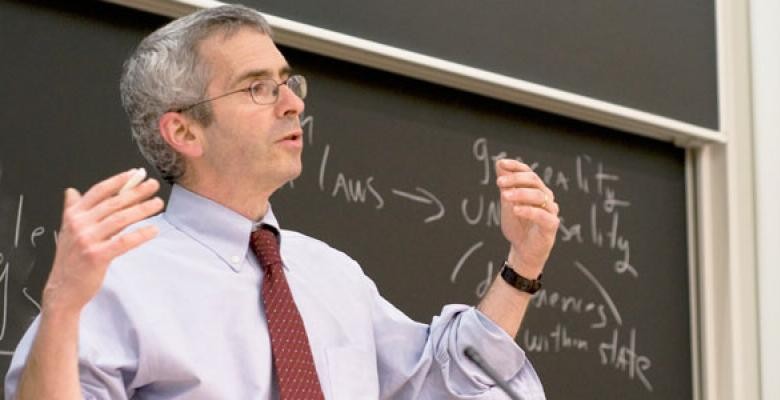In Aftermath of Citizens United, Law School Professor Keeps An Eye on the Money

As a flood of cash from wealthy individuals finds its way into campaign coffers for this year’s elections, Law School Professor Richard Briffault is following the money.
The effect of the U.S. Supreme Court’s 2010 Citizens United decision allowing corporations to make independent contributions isn’t exactly what many people feared, says Briffault.
Although some big businesses and trade groups are engaged in spending, the big development has been the surge of very wealthy individuals who are giving money, pooling their resources, and creating or supporting organizations that hire political strategists and buy advertising to make their voices heard.
“Of course, these often are people who made their money in business. It’s the Koch brothers, not Koch Industries,” he adds, referring to Charles and David Koch, who have donated large sums of money to conservative and libertarian causes.
The impact on this year’s midterm elections won’t be clear until the votes are counted, he says, but what may be more important is the impact on what candidates do before and after the campaign.
“People need to have a certain amount of money to be credible,” says Briffault (CC’74), the Joseph P. Chamberlain Professor of Legislation and an expert on campaign finance. “To what extent does this affect the legislation they’re willing to support and the votes they’re willing to cast? How does it affect what they’re willing to do as an elected official?”
At the very least, he says, the need to raise substantial amounts of money is “a huge distraction keeping legislators from thinking about issues, working on policy and meeting with other constituents who are not big donors.” It also can be a deterrent for potential candidates to get involved and an incentive for some officials to step down, sometimes even before their terms are up.
Individuals can contribute a maximum $2,600 to a federal candidate, in both a primary and a general election. Even if spouses and children also contribute, that doesn’t add up to a huge amount, Briffault says.
But if those donors pool their funds with others in an organization separate from a candidate or party, they can spend millions. Super PACs are just one way this is happening, he says. Although officially independent, they can accept unlimited contributions and engage in unlimited expenditures supporting or opposing a candidate. There also are organizations formed around a common ideology, such as cutting taxes, reducing the size of government or abortion rights – pro and con.
Briffault, a summa cum laude graduate of Columbia College who joined the Law School faculty in 1983 with a law degree from Harvard, is currently working on a book about campaign finance.
The system is falling apart, he says, and the result is likely to be either no regulation of election spending, “which some people think is not that different from what you have now,” or public financing of elections, something he favors. Briffault served on New York State’s Commission to Investigate Public Corruption, known as the Moreland Commission, which recommended public financing of elections. Democratic Gov. Andrew Cuomo generated controversy and was criticized by Columbia alumnus Preet Bharara (LAW’93), U.S. Attorney for the Southern District of New York, when he disbanded the commission in March.
Besides the congressional races, there are interesting state contests to watch this year, says Briffault, whose teaching and research also focus on state and local government. For example, there’s a tight race in Florida, where former Republican Gov. Charlie Crist is running as a Democrat against the current GOP Gov. Rick Scott. In Wisconsin, Republican Gov. Scott Walker, who survived a recall vote in 2012 and has been mentioned as a possible presidential candidate in 2016, faces a tough challenge from Democrat Mary Burke, a former Trek Bicycle executive and state commerce secretary.
The Republican victories in many state legislative elections of 2010 will continue to have huge consequences this year, through the redistricting plans they adopted after the 2010 census, and through new voter identification laws and limits on early voting that make it harder for some people to vote. “This especially affects the poor, the elderly and people who have moved around a lot,” Briffault says. “ This could have a real partisan effect on election outcomes.“